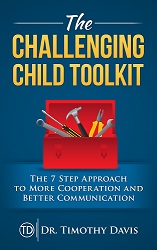We weren’t raised this way.
Although positive parenting ideas have been around for decades, most of our parents did not believe that respecting, understanding and empathizing with a child’s feelings lay at the heart of parenting; neither did they believe in collaboratively resolving differences with children. More typically, parents of previous generations ignored or dismissed the feelings of their misbehaving children. These parents, instead, focused on getting their children to “behave” through the use of punishments. Punishments are effective at establishing order and control in families, but by ignoring the feelings that lay behind misbehavior these parents left their child not knowing how to recognize his or her emotional states and without tools to manage negative feelings appropriately.
Parents of previous generations also generally did not work with their children to resolve differences. Listening to a child’s point of view, working out a compromise, or even apologizing to a child after a parent had made a mistake or acted hurtfully were all seen as actions that would undermine the parent’s authority. Unfortunately, these old approaches teach that ‘might makes right’ when it comes to dealing with conflicts. They don’t teach a child how to resolve differences. The ability to resolve the inevitable differences that arise in relationships is a key component of emotional intelligence, according to marriage and family researcher John Gottman, and this skill is ultimately associated with greater happiness and fulfillment in marital, friendship, and work relationships throughout life.
At a gut level, most of us feel our self-esteem enhanced when our loved ones devote the time and attention to understanding and validating our feelings. We assume this is true for our children as well. On a more practical level, most of us wish that we were better at recognizing what we feel and wish we had a greater capacity for managing our negative feelings constructively, rather than being overwhelmed by them. Most of us, furthermore, think that our lives and relationships would be happier and more satisfying if we were more skilled at resolving differences.
So, again, we are faced with the question of why the good and compelling advice of positive parenting books is so hard to follow? It is precisely because we weren’t raised this way. These practices aren’t instinctive or intuitive for us. Yelling, threats, and punishments (or giving in and withdrawing) are. We grew up with a model of parent-child conflict resolution that involves a dominant parent imposing his or her will on a child who is forced to submit (or fight back). To deal with a misbehaving child using a positive parenting approach – that is, by first trying to understand and accept the feelings behind a child’s misbehavior and then guiding the child towards a more appropriate expression of the feelings requires that we stop our automatic, instinctive response, step back, and think of a creative approach to the situation. To do this we must remain calm. However, maintaining a cool head in the middle of an escalating power struggle with a child is very difficult to do.
We aren’t wired this way.
One reason that it is so hard to think in moments of conflict has to do with the way our brains are wired. Humans, like all other animals, respond to threat by getting into fight or flight mode. Fight or flight evolved to help our animal ancestors survive in situations where quick action was required. An animal confronted by a predator has to decide in an instant whether to run or fight. Because thinking is slow, fight or flight includes shutting off reflective thinking to promote fast action. The animal that stops to calmly reflect on the situation and weigh its options before deciding what to do gets eaten. It is more accurately described as a fight or flight and don’t think response. Fight or flight mode is an adaptive response to physical danger, but it’s really unhelpful when it comes to resolving differences in our intimate relationships.
Getting into power struggles with our children is very stressful and, unfortunately, it can get us into fight or flight (and don’t think) mode. In these moments of stress we revert to our oldest, deepest memories of parent-child interactions. We get swept up in a battle of wills where we have only two choices: either we are dominant and enforce our will on our child (and dismiss our child’s feelings), or we empathize with our child’s distressed feelings and let our child dominate us with his or her tantrums. Even worse, many of us end up doing both. First we permissively attend to our child’s tantrum, then get fed up and shift to threats and punishments. Being both firm and empathic isn’t an option that occurs to us in these moments because we are stuck in our past where the either/or of dominance and submission are the only choices.
In fight or flight mode we aren’t thinking and therefore we aren’t thinking about our child’s feelings or the full impact of our actions. As a result, we might criticize, label, blame, vent our anger, and do other hurtful things that we later regret. Or we give in to the tantrum to get it stop now, but by giving in we teach our child that tantrums are a way to get what you want and we ensure that our child will tantrum more in the future.
(To skip to how to start addressing these problems, click here.)

